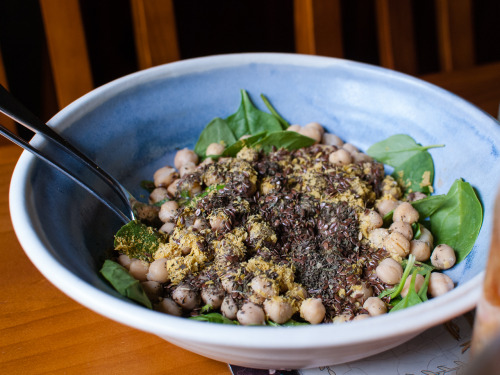
A well planned vegan diet can easily supply your daily protein needs. Legumes, grains, nuts, seeds, plant-based milks and vegetables are all good sources of protein. However a vegan diet can also fall short in protein if it relies too heavily on fruit (like in some raw vegan diets) or incorporates too many vegan processed foods (confectionary, crisps, biscuits, refined foods).
Protein needs are very individual and are related to factors such as body mass, activity and age. Protein needs are greater if you are pregnant or breastfeeding. There are also some medical conditions that increase your protein needs. Speak to a health professional if you need help working out your protein requirements.
An average weight male will need a minimum of 60g protein per day. Let’s take a closer look at the protein content of some common vegan foods and see how easy it is to achieve this goal.
| Food | Protein (g) |
| Tofu (firm) ½ cup = 100g | 13 |
| Tempeh ½ cup = 100g | 19 |
| Lentils ½ cup cooked | 7.8 |
| Chickpeas ½ cup cooked | 6.3 |
| Edamame ½ cup | 10 |
| Kidney beans ½ cup cooked | 7 |
| Soy beans ½ cup | 15 |
| Sanitarium Vegie D’light Vegie Roast (120g serve) | 20g |
| Falafels – 3 (50g) | 7 |
| Almonds 30g (25 nuts) | 6 |
| Cashews 30g (25 nuts) | 6 |
| Peanut Butter 1 tbsp | 4.5 |
| Hemp seeds ¼ cup | 13 |
| Chia seeds 1 tbsp | 2.5 |
| Tahini 1 tbsp | 3.6 |
| Pumpkin seeds ¼ cup | 10 |
| Flaxseeds ¼ cup | 7 |
| Soy milk 1 cup | 9 |
| Rice Milk 1 cup | 1.5 |
| Protein enriched Rice milk 1 cup | 3.7 |
| Almond Milk 1cup | 1.5 |
| Soy yoghurt 200g tub | 3.6 |
| Coconut yoghurt 170g tub | 1.4 |
| Amaranth 1 cup cooked | 9.4 |
| Oats 1 cup cooked | 6 |
| Quinoa 1 cup cooked | 8 |
| Brown rice 1 cup cooked | 4 |
| Kamut 1 cup cooked | 12 |
| Millet 1 cup cooked | 6 |
| Vegetables and fruit per ½ cup | 0.5-2 |
Note that there is a large variation in the protein content of plant-based milks. Soy milk contains the most protein at 9g per cup however most other plant based milks are poor sources of protein. Some plant milk are enriched with protein . (Look out for future updates on both soy and plant based milks)
So in order to achieve his minimum 60g of protein per day, our average male could aim for:
Breakfast: Chia breakfast pudding 2tbsp chia seeds + 1 cup protein enriched rice milk + 2 tbsp flaxseeds/flaxmeal + cinnamon + 1 serve fruit
Lunch: Quinoa Salad 1 cup cooked Quinoa + ½ cup edamame beans + 1 cups salad vegetables + drizzle of olive oil and lemon juice
Dinner: Dhal 1 cup cooked lentils + 1 cup cooked brown rice + 1.5 cups cooked vegetables
Snacks: 30g almonds + 1 serve fruit + 1 slice sourdough bread with ¼ avocado
Total protein = 70g/2000 calories
Protein Powders
It is better to get your protein from whole foods as they contain other key nutrients such as iron, zinc and calcium. If you rely on protein powders to reach your protein target it can be harder to meet your requirements for these other vital nutrients. However, there may be times where a protein powder may be useful. Vegan athletes, growing teenagers or elderly vegans may find a protein powder can help meet their higher protein needs. Vegan protein powders are based on plant proteins such as pea, soy and rice. Such supplements provide between 15 and 25g protein per serve.
Written by Linda Smillie – Accredited Practising Dietitian, Accredited Nutritionist. BSc, Grad Dip Nut Diet
I am a Canberra based dietitian who specialises in plant based diets and gastroenterology. If you are new to plant based eating or a long term vegan I can help make sure you are getting all the essential nutrients you need to optimise your health. I practise at Waramanga and Garran. Email me at smillielinda@gmail.com for more details.

